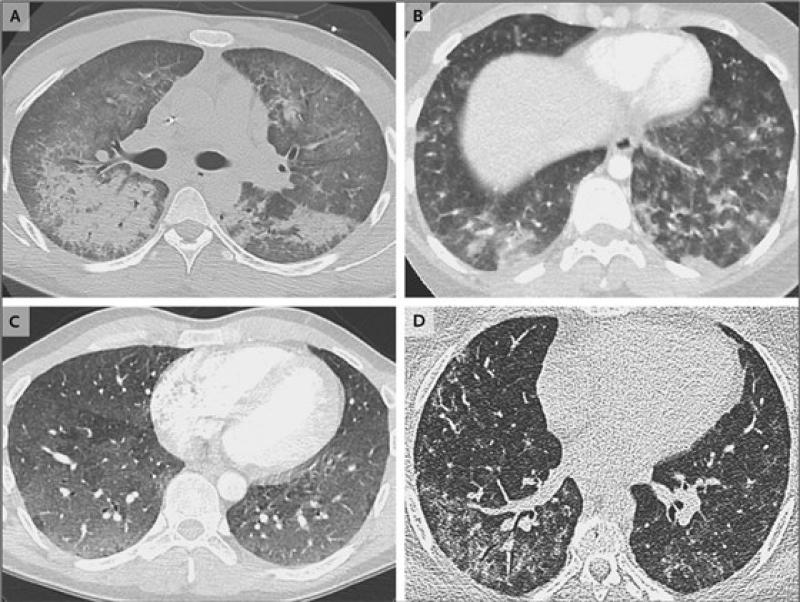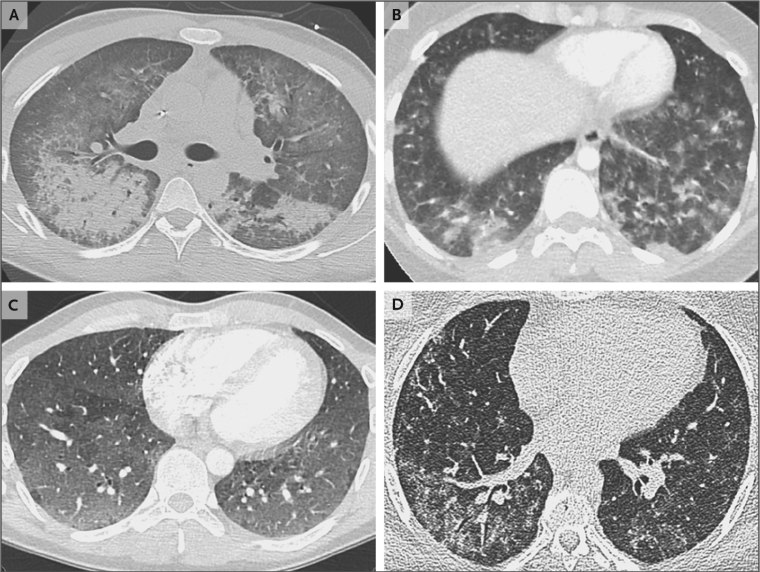CDC warns about e-cigarette use after rise in vaping-related deaths



A severe and puzzling lung disease linked to electronic cigarettes and other vaping devices has doctors across the country scrambling to diagnose and care for patients struggling to breathe. On Friday, the Centers for Disease Control and Prevention said the number of vaping-related illnesses jumped to at least 450 cases in 33 states and cautioned people about using e-cigarettes, especially those bought off the street .
As of Friday, five deaths from vaping-related respiratory illness were reported.
“These are not just cases or data points,” said Jennifer Layden, chief medical officer of the Illinois Department of Health. “These are individuals who are suffering.”
Health officials in California, Indiana and Minnesota each announced one death on Friday. The Minnesota Department of Health said the patient who died in that state was over 65. An investigation revealed the cause of death was linked to vaping illicit products containing THC, the psychoactive compound in marijuana.

Computed tomographic scans of the chest obtained from patients with vaping-associated lung injury. NEJM
In California, an unidentified patient older than 55 was felled by the mysterious disease after using a vaping device to consume THC, Los Angeles County Department of Public Health's Dr. Muntu Davis told reporters Friday at an afternoon press conference.
Out of 12 cases of illness linked to vaping this summer in the nation's second largest county, only one did not involve a cannabis product, he said.
Indiana officials did not release any details about the death reported in the state. Two other deaths in Oregon and Illinois were previously disclosed.
The announcements come amid new recommendations from the Centers for Disease Control and Prevention that people stay away from vaping devices while investigators work to pinpoint exactly what’s behind the illnesses.
“CDC has advised that individuals consider not using e-cigarettes because as of now, this is the primary means of preventing this severe lung disease ,” Dr. Dana Meaney-Delman, with the CDC’s Lung Injury Response team, said on a call with reporters.
Los Angeles County health officials also called for a vaping moratorium.
"We join with the Centers for Disease Control to advise people to stop vaping now until further information about what is causing lung damage and death can be understood," Barbara Ferrer, director of the county's health department, told reporters Friday.
The Food and Drug Administration has tested 120 product samples, and so far has been unable to identify any one brand, ingredient or substance that could explain the illnesses.
While the investigation continues, officials urge consumers to steer clear of potentially counterfeit products.
“If you’re thinking of purchasing one of these products off the street, out of the back of a car, out of a truck, in an alley, or if you’re gonna then go home and make modifications to the product itself using something that you purchased from some third party or got from a friend, think twice,” Mitch Zeller, director of the FDA’s Center for Tobacco Products, said on the call with reporters.
The investigation has been hindered by the need to rely on patients’ disclosing exactly what they’d vaped, as many have reported using a variety of devices and e-liquids in the days, weeks and months before becoming ill. And some patients may be reluctant to admit using marijuana.
Now that doctors in multiple states and the Virgin Islands, which has reported one case, have had a chance to compare notes, they’re finding similarities.
Patients generally feel pretty lousy for a few days, and tend to be misdiagnosed with either bronchitis or a viral illness.
When treatments for those conditions fail, their symptoms worsen to the point where they’re having trouble breathing, forcing patients to seek help in an emergency department, said Dr. Daniel Fox, a pulmonary and critical care specialist with WakeMed Health and Hospitals in Raleigh, North Carolina. North Carolina is investigating 23 cases.
Misdiagnosed illnesses
Most patients experience shortness of breath, fever, cough, fatigue, nausea and vomiting. All said they’d recently vaped either THC, nicotine, or a combination.
The same symptoms have shown up in 53 patients in Illinois, where the majority have been otherwise healthy, relatively young men.
“All patients had abnormalities seen in imaging apparent in both lungs,” said Dr. Jennifer Layden, chief medical officer and state epidemiologist for the Illinois Department of Public Health.
She and health officials at the Wisconsin Department of Health Services published their findings about vaping-related cases in the New England Journal of Medicine on Friday . Illinois has reported 53 either confirmed or possible cases; Wisconsin has reported 34.
They, too, found misdiagnosis was common at first. Seventy-two percent of their patients who’d been hospitalized after vaping had been seen previously by a doctor for their symptoms.
By the time patients were hospitalized, more than half needed to be placed in intensive care. A third were put on ventilators.
Doctors said that those who vape should seek medical help if they start developing symptoms, such as shortness of breath, cough, fever, chest pain, extreme fatigue, vomiting or diarrhea.
Electronic cigarettes have been touted as a way for people to quit combustible cigarettes, known to cause nearly a half million deaths per year.
But doctors treating the current spate of vaping-related illnesses say the patients they tend to see are not long-time smokers. Most are young and otherwise healthy.
“This is not being a way to get off traditional tobacco products. It’s an alternative way to deliver substances,” said Fox.
Thursday, the New York State Department of Health said lab tests showed extremely high levels of vitamin E acetate in nearly all of the analyzed samples of products that contained cannabis.
Vitamin E acetate was not found in the nicotine products tested.
The compound is a commonly available nutritional supplement that is not known to be harmful when taken as a vitamin or applied to skin, according to the New York State Department of Health.
But Zeller, of the FDA, suggested it’s premature to focus on vitamin E, saying that it’s likely just one piece of the puzzle.
Investigators urge people who have symptoms to report them at a government website: www.safetyreporting.hhs.gov
Tags
Who is online
36 visitors

These devices are coating the lungs with chemicals that have an unknown effect. While the cases are rare compared to the number of users, this should (for those who apply reason) suggest that vaping should be considered risky.
I've tried vapes on occasion when trying to quit smoking cigarettes'. I didn't care for it.
Here in Michigan with legalized weed the THC vapes are all the craze, they are everywhere. I seen a guy take a huge hit, cough, then fall flat on his face unconscious on the floor....
This seemed like a good idea on the surface. I mean, it has to be better than smoking actual cigarettes, right? But of course, people aren't just using it to get off cigarettes.
It's amazing to me how with a thing like this, people will just dive into using it without a clue as to the long term effects, but they'll be so careful about other things they put in their bodies.
I'll have to have another talk with my son about Juuling. I've never suspected him of trying it, but I know some of his friends/classmates do it, and it's a big enough problem here that our schools just increased the severity of the punishment for any student caught with a Juul. Fortunately, our schools have been very proactive regarding e-cigs.
I read an article that was stating it is mostly people ordering products on line that are not reputable. There are a lot of sketchy sources and a lot of times one will not know what it is, or what is in it.
I know people that are using it and have replaced smoking. They have never had a problem.
Logic suggests that for the majority of people vaping has not been a problem. The medical cases are indeed rare. The point, however, is that there are medical cases and currently medical science has not determined the cause except tying it to vaping.
The unknown is a red flag for caution.
It may indeed be the result of users inadvertently poisoning themselves with third party products (online flavors) or off-brand / street-level vaping devices. In the meantime, caution with a new technology that delivers unknown gases into your lungs seems to be wise.
I also read that in several cases the people were using some kind of cannabis vape.
It made me think of spice, that has chemicals and people are having bad reactions.
They just don't know though.
My one thought was just how different people react to different things. Different allergies and tolerance levels. Like how one person can be stung by a bee and have no problem yet another might swell up and need medical treatment.
Agreed, we are all different in subtle ways. Take regular smoking as an example. Some like George Burns lived to 100 with a cigar perpetually in his mouth while other non-smokers die of lung cancer from second hand smoke.
We cannot avoid the poisons from our environment (at least not individually) but we certainly can choose to not introduce another factor.
Just as an fyi cigar smokers generally don't inhale whereas second hand is definitely inhaled.
But they breathe in their own second-hand smoke, cannot avoid it, and are at risk for oral cancers.
Back to George Burns and the other positive exceptions who seem to defy all odds.
I hope they can identify the contaminate soon. Without identifying the substance it is not likely the manufacturers even know they are causing the illnesses or what ingredients are responsible for these sudden illnesses and deaths.